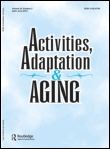
Activities Adaptation & Aging
Scope & Guideline
Elevating gerontology through impactful research and practice.
Introduction
Aims and Scopes
- Active Aging and Participation:
The journal emphasizes the importance of active participation in various activities for older adults, exploring how such engagement affects their mental, physical, and emotional well-being. - Technology and Aging:
It investigates the role of technology in enhancing mobility, communication, and overall quality of life for older adults, highlighting innovations that facilitate their independence. - Health and Well-Being:
Research often focuses on health literacy, mental health, and physical health, examining factors that contribute to successful aging and the role of community support in these areas. - Social Support and Community Engagement:
The journal explores the dynamics of social support networks and community involvement, assessing their impact on loneliness, social connectedness, and overall life satisfaction among older individuals. - Adaptation Strategies:
It discusses various strategies that older adults use to adapt to changes in their physical and cognitive abilities, including lifestyle modifications and therapeutic interventions.
Trending and Emerging
- Impact of COVID-19 on Older Adults:
Recent publications have increasingly focused on the effects of the COVID-19 pandemic on older adults, addressing issues like social isolation, mental health, and adaptations to lifestyle changes. - Technology Adoption and Digital Engagement:
There is a growing trend towards exploring how older adults adopt technology for social interaction, health monitoring, and mobility solutions, indicating a shift towards digital inclusion. - Holistic Health Approaches:
Emerging themes emphasize holistic health and well-being approaches, incorporating psychological, emotional, and social factors alongside physical health. - Community-Based Interventions:
Research is increasingly focused on community-driven interventions that promote active aging and social participation, reflecting a shift towards grassroots solutions. - Creative and Arts-Based Therapies:
There is a rising interest in the use of creative arts as therapeutic interventions for older adults, exploring how activities like music, dance, and art contribute to cognitive and emotional health.
Declining or Waning
- Traditional Aging Models:
There appears to be a waning interest in traditional models of aging that view aging solely as a decline. The focus has shifted towards more holistic and positive perspectives on aging. - Age-Specific Stereotypes:
Research exploring ageist stereotypes and negative perceptions of aging has become less prominent, as the journal increasingly emphasizes empowerment and active engagement of older adults. - Generalized Exercise Regimens:
There has been a decline in publications focused on generalized exercise programs without consideration for individual needs and preferences, as the trend moves towards personalized and adaptive physical activity strategies. - Isolation Studies without Technological Solutions:
Studies on social isolation that do not incorporate technological solutions or modern communication methods have decreased, indicating a shift towards integrating technology in addressing social connectivity. - Institutional Aging Perspectives:
Research focused on aging within institutional settings, such as nursing homes, appears to be less frequent, possibly as the emphasis shifts towards community-based approaches and aging in place.
Similar Journals
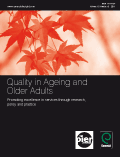
Quality in Ageing and Older Adults
Exploring the Future of Aging with ExpertiseQuality in Ageing and Older Adults is an esteemed journal published by Emerald Group Publishing Ltd, dedicated to elucidating the complexities and challenges of aging and the quality of life for older adults. With a focus on critical areas within Care Planning, Community and Home Care, and Gerontology, this journal serves as a vital resource for researchers, healthcare professionals, and students alike. Recognized for its scholarly contributions, it holds a Q2 ranking for Care Planning and Community and Home Care and maintains an impactful presence in Gerontology, further demonstrated by its Scopus rankings. Although the journal does not offer open access, its commitment to advancing knowledge in the field is underscored by its ongoing publication since 2000 and its broad scholarly reach until 2024. By fostering innovative research and practical insights, Quality in Ageing and Older Adults continues to play a crucial role in informing policy, enhancing care practices, and improving outcomes for older individuals.
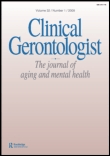
Clinical Gerontologist
Pioneering research for a healthier, happier aging experience.The Clinical Gerontologist is a premier journal published by Routledge Journals, Taylor & Francis Ltd, that focuses on the interdisciplinary field of gerontology and clinical psychology. With its rich history dating back to 1982 and extending until 2024, this journal serves as a vital resource for researchers, practitioners, and students interested in the complex dynamics of aging and the psychological aspects of care for older adults. Boasting a commendable impact factor and ranking in the top quartiles across multiple categories—including Social Sciences, Geriatrics, and Clinical Psychology—the Clinical Gerontologist demonstrates its commitment to advancing knowledge and best practices within this critical area. Its rigorous peer-reviewed articles address emerging trends, evidence-based practices, and policy implications, making it essential reading for anyone involved in geriatric care and research. While not an open-access journal, it provides access to its diverse range of scholarly articles and research findings, ensuring that critical information reaches those dedicated to enhancing the well-being of the older population.

Journal of Cross-Cultural Gerontology
Unraveling the Tapestry of Aging in Diverse ContextsJournal of Cross-Cultural Gerontology, published by SPRINGER, is an influential academic journal that focuses on the complex interactions between culture and aging in a global context. Since its inception in 1986, this journal has committed to exploring the multifaceted aspects of gerontology through an interdisciplinary lens, making it a valuable resource for researchers, healthcare professionals, and students alike. The journal is ranked in the second quartile of both Geriatrics and Gerontology and Health (social science), reflecting its substantial contribution to the field and its commitment to high-quality research. With an impact factor that showcases its relevance within the scholarly community, the journal provides a platform for empirical studies, theoretical discussions, and critical reviews that address the needs and challenges of an aging population across diverse cultural settings. Although it does not currently offer open access, its robust indexing and reputation within the Scopus database—ranking #134 out of 371 in Social Sciences (Health) and #65 out of 116 in Medicine (Geriatrics)—underscore its impact and credibility in the field. By bridging cultural perspectives and gerontological research, the Journal of Cross-Cultural Gerontology stands as a pivotal resource for advancing knowledge and practices in aging-related studies.
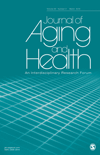
JOURNAL OF AGING AND HEALTH
Advancing understanding of aging and health.The JOURNAL OF AGING AND HEALTH, published by SAGE PUBLICATIONS INC, is a preeminent peer-reviewed journal dedicated to advancing research in the field of gerontology and related disciplines. With an impressive impact factor and ranked Q1 across multiple categories including Community and Home Care, Geriatrics and Gerontology, and Health (Social Science), this journal has established itself as a vital resource for academics, clinicians, and policymakers alike. Spanning over three decades of publication from 1989 to 2024, it serves as a platform for innovative research and multifaceted discussions on aging, health, and the interplay of social factors influencing the elderly population. The journal's rigorous standards for publication ensure high-quality contributions that are impactful and relevant, making it an essential read for those dedicated to improving the health and quality of life for older adults. Although it is not an open-access journal, it provides comprehensive insights that are critical to understanding the complexities of aging in today's society.

BMC Geriatrics
Advancing knowledge for a healthier aging population.BMC Geriatrics is a leading open-access journal dedicated to advancing the field of geriatrics and gerontology. Published by BMC, this esteemed journal has been at the forefront of research since its inception in 2001, providing a vital platform for sharing innovative studies and insights that address the complexities of aging. With an impressive Q1 ranking in the 2023 category of Geriatrics and Gerontology and a solid Scopus ranking at #40 out of 116, BMC Geriatrics showcases high-impact research that influences clinical practices and policy-making. As a fully open-access publication, it ensures that groundbreaking research is freely available to researchers, practitioners, and students alike, promoting the diffusion of knowledge across the global healthcare community. This journal is crucial for anyone interested in the latest developments in elderly care, health issues affecting aging populations, and innovative interventions designed to improve quality of life among older adults.

Journal of Aging and Environment
Bridging Disciplines to Enhance Elder Well-BeingThe Journal of Aging and Environment, published by Routledge Journals, Taylor & Francis Ltd, serves as a pivotal platform for interdisciplinary research concerning the intersections of aging, environmental factors, and social sciences. With a focus on understanding the implications of environmental changes on the aging population, this journal aims to foster insightful discussions and innovative solutions to address the challenges faced by older adults in diverse contexts. Achieving a Q3 ranking in multiple categories including Environmental Science and Gerontology, this journal not only reflects high-quality research but also contributes to shaping policy and practice in these vital fields. Researchers, academics, and practitioners are invited to engage with original articles and critical reviews that advance knowledge and understanding of aging in an ever-evolving environment. Though it is currently not an Open Access publication, the insights shared within its pages underscore the urgent need for awareness and action concerning the health and well-being of our aging society.
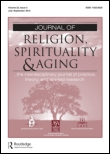
Journal of Religion Spirituality & Aging
Fostering Insights into Spirituality Across the LifespanThe Journal of Religion, Spirituality & Aging, published by Routledge Journals, Taylor & Francis Ltd, is a vital interdisciplinary platform that explores the intricate relationships between spirituality, religion, and the aging process. With an ISSN of 1552-8030 and an E-ISSN of 1552-8049, this journal critically addresses the evolving challenges and opportunities faced by older adults in the context of faith and spirituality. Covering a wide range of topics and methodologies, it has garnered a strong reputation in its field, achieving a Q1 ranking in Religious Studies and a Q3 ranking in Life-span and Life-course Studies for 2023. The journal serves as an essential resource for researchers, professionals, and students interested in gerontology, psychology, sociology, and related fields, fostering a deeper understanding of how spirituality can enhance the quality of life among older populations. While not an open-access journal, it continues to contribute significantly to the discourse on aging and spirituality through carefully curated scholarly articles, reviews, and studies.
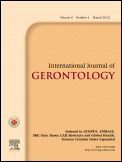
International Journal of Gerontology
Navigating the challenges of aging with cutting-edge research.International Journal of Gerontology is a distinguished peer-reviewed journal dedicated to advancing the field of gerontology and addressing the multifaceted challenges associated with aging. Published by the Taiwan Society of Geriatric Emergency & Critical Care Medicine, this innovative journal has been an open-access platform since 2018, ensuring that vital research is accessible to a global audience. With an ISSN of 1873-9598, it serves as a crucial resource for researchers and practitioners focused on the biological, psychological, and social aspects of aging. The journal is indexed in Scopus with a rank of #103/116 in the Medicine category (Geriatrics and Gerontology) as of 2023, placing it in the Q4 quartile—a testament to its evolving impact in the field. Spanning works published from 2007 to 2024, the International Journal of Gerontology facilitates the dissemination of critical research findings and clinical practices that inform and enhance geriatric care and research methodologies.

Aging Medicine and Healthcare
Empowering Healthcare for Aging PopulationsAging Medicine and Healthcare is a leading Open Access journal dedicated to advancing the understanding of geriatric health and the complexities of aging. Published by the Asia Pacific League Clinical Gerontology & Geriatrics, this innovative journal began its journey in 2019 and has since established itself as an important resource for healthcare professionals, researchers, and students interested in the fields of geriatrics and gerontology. With an impact factor that reflects its growing significance (ranked in the 21st percentile within its category), the journal aims to disseminate high-quality research and practical insights that can inform clinical practice and enhance patient care for aging populations. As an Open Access publication, it ensures that research findings are freely accessible, fostering collaboration and knowledge sharing among academics and practitioners globally. The journal is poised to be a vital platform for innovative studies, systematic reviews, and case reports that illuminate the challenges and opportunities in aging medicine.

GERONTOLOGIST
Connecting Scholars to Enhance Aging ResearchThe GERONTOLOGIST, published by Oxford University Press Inc, is a premier journal in the field of geriatrics and gerontology, with a distinguished history since its inception in 1961. This esteemed journal stands out with its impressive Q1 rankings in prominent categories, including Geriatrics and Gerontology, reflecting its vital role in disseminating innovative research and advancing knowledge within these critical disciplines. With an impact factor that ranks it among the top journals in both Nursing Gerontology and Medicine, the GERONTOLOGIST serves as a key resource for researchers, professionals, and students dedicated to enhancing the health and well-being of older adults. Although it operates under a traditional access model, the journal remains committed to publishing cutting-edge studies that address the complexities of aging and inform evidence-based practices. By fostering a rich dialogue among scholars and practitioners, the GERONTOLOGIST is instrumental in shaping the future of gerontological research and policy.